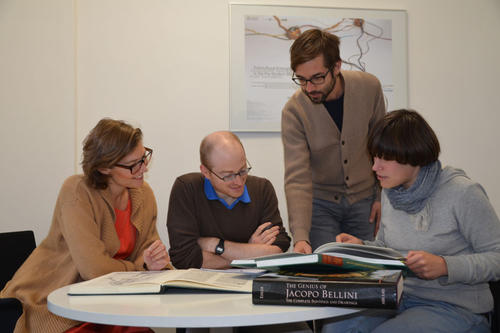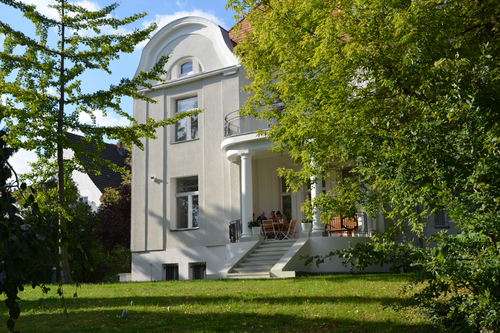Knowledge in Motion
The researchers examine historical bodies of knowledge and the transfer of knowledge from a global history perspective.
Image Credit: Dr. Kristiane Hasselmann
Coming from diverse academic disciplines, 80 scholars working in 20 subprojects address the emergence and transformation of knowledge in earlier epochs.
Image Credit: Dr. Kristiane Hasselmann
Researchers involved in the Collaborative Research Center “Episteme in Motion. Transfer of Knowledge from the Ancient World to the Early Modern Period,” examine processes of knowledge change in European and in non-European pre-modern cultures.
News from Aug 21, 2014
The Greek term “episteme” encompasses different areas of “knowledge” and of “science/scholarly activity,” while simultaneously defining knowledge as the “knowledge of something.” The “Episteme in Motion” Collaborative Research Center examines the thesis that knowledge is always constituted through processes of transfer because every attempt to fix knowledge, pass it on, codify it, or edit it didactically involves an element of movement, as does the discarding of previously established knowledge. It has often been disputed that this holds true for pre-modern cultures
Knowledge in the Pre-modern World
How is new knowledge created? How does it gain validity in a society? How does it change? Which cultural ties were of particular importance for the emergence and transformation of knowledge in earlier epochs of humanity?
These kinds of questions are being addressed by approximately 80 scholars working in 20 subprojects of the Collaborative Research Center (SFB) 980 with regard to epochs and cultures in pre-modern times. Temporally the period covered extends from the 7th century B.C. to the 18th century A.D.
A Global Perspective
The researchers examine historical bodies of knowledge and the transfer of knowledge from a global history perspective, which expressly aims to overcome Eurocentric perspectives and which includes long-term movements that take place over centuries and millennia. They consider, for example, the confrontation of philosophical schools and traditions, how images are transferred from one medium to another, how scientific or theological discourses are recorded in poetic texts, and how such texts are expanded or continued in sequels or translated into other languages.
Pooling Expertise – Small Specialized Subject Areas and Big Research Projects
The Collaborative Research Center can draw on a unique reservoir of academic disciplines examining the history of culture, art, and literature at Freie Universität through the interdisciplinary collaboration of numerous “small” specialized subject areas in the Department of Philosophy and Humanities and the Department of History and Cultural Studies. In addition to philosophy, history, religion, the arts, and literature, disciplines represented by smaller sub-departments such as Egyptology, Ancient Near Eastern Studies, Arabic studies, Iranian studies, Jewish studies, and Modern Greek studies, are involved.
Dissemination of Research Results
The “Episteme in Motion” Collaborative Research Center regularly organizes public events. Following its cooperation with the Haus der Kulturen der Welt and a lecture series organized as part of the Open Lecture Halls at Freie Universität, the researchers are now working on a transfer project with the Museum of Islamic Art in Berlin. A jointly curated exhibition is scheduled to open in 2016.
The Collaborative Research Center is funded by the German Research Foundation (DFG). It was set up in 2012. Besides Freie Universität, the participating institutions are Humboldt-Universität zu Berlin and the Max Planck Institute for the History of Science.
The spokesperson for the SFB is Gyburg Uhlmann, a professor of classical philology with a focus on Greek at the Institute of Greek and Latin Languages and Literatures.
Further Information
- Homepage: www.sfb-episteme.de/en
- Dissemination of Research Results: www.sfb-episteme.de/en/Listen_Read_Watch


